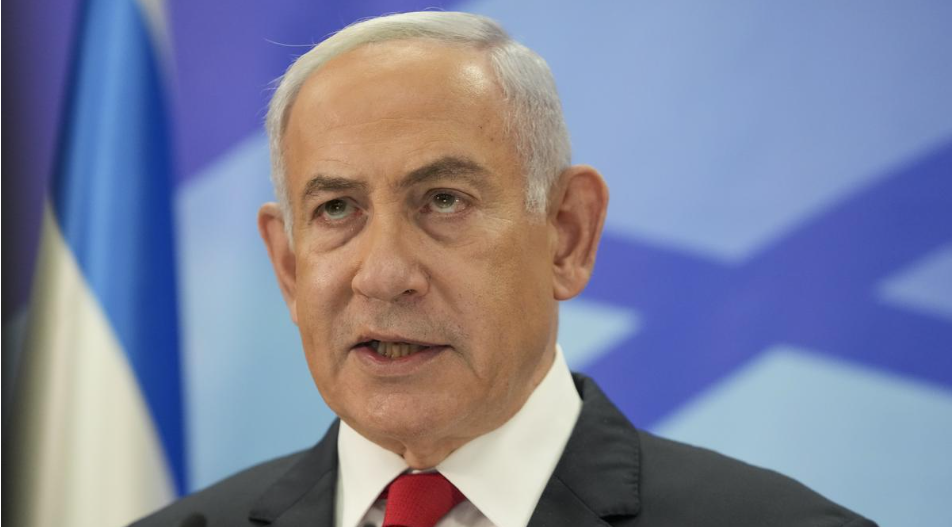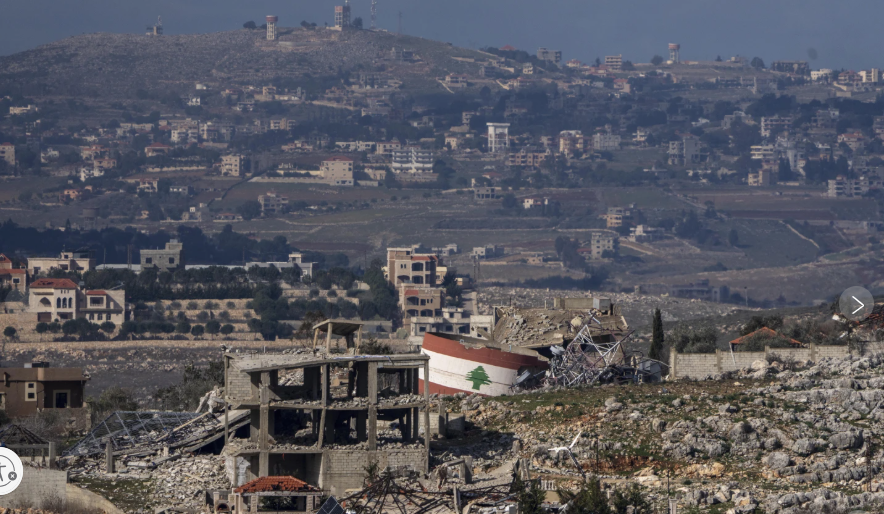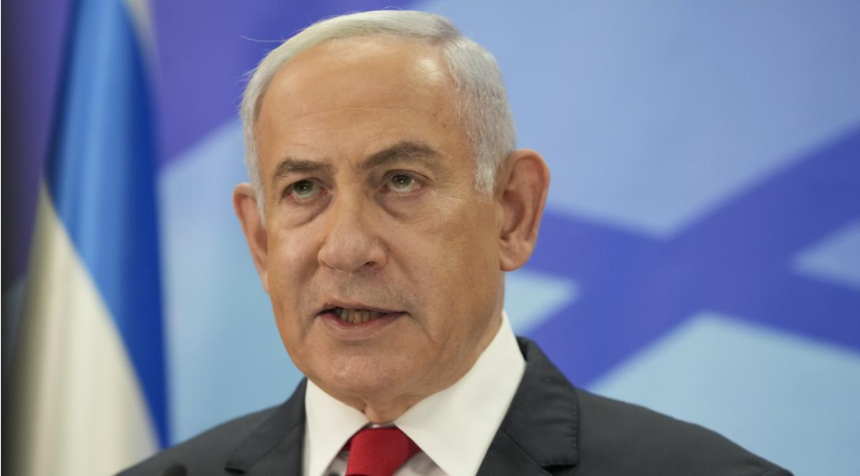Netanyahu Hints Israeli Prime Minister Benjamin Netanyahu has suggested that Israel might not complete its withdrawal from southern Lebanon by the agreed ceasefire deadline, citing concerns over security and the resurgence of Hezbollah activity near the border. This unexpected development has raised tensions in an already fragile region and could jeopardize the ceasefire agreement that brought temporary relief to months of conflict.
The announcement, made during a press briefing on January 25, 2025, has drawn criticism from international stakeholders, including the United Nations, which brokered the ceasefire agreement, and neighboring Arab states. It also risks inflaming public opinion in Lebanon, where anti-Israeli sentiment remains high following recent hostilities.
Background: The Israel-Lebanon Conflict
Tensions between Israel and Lebanon have flared repeatedly over the years, primarily due to the activities of Hezbollah, the Iran-backed militant group that operates in southern Lebanon. The most recent conflict, which erupted in mid-2024, saw intense fighting between the Israeli Defense Forces (IDF) and Hezbollah militants, resulting in hundreds of deaths, widespread destruction, and the displacement of thousands of Lebanese civilians.
After months of military escalation and increasing international pressure, a ceasefire was brokered in December 2024, with the involvement of the United Nations and key global players, Netanyahu Hints including the United States and France. Under the agreement, Israel agreed to withdraw all its forces from Lebanon by January 30, 2025, while Hezbollah promised to cease cross-border rocket attacks and military operations near the border.
The ceasefire was widely seen as a fragile yet critical step toward de-escalating tensions in a region long plagued by instability. However, recent developments now threaten to derail the deal, reigniting fears of a return to conflict.
Netanyahu’s Justifications for a Possible Delay
In his latest remarks, Prime Minister Netanyahu expressed doubts over Israel’s ability to complete its withdrawal from southern Lebanon by the January 30 deadline. He cited ongoing security concerns, claiming that Hezbollah has not fully adhered to the terms of the ceasefire and continues to pose a threat along the border.
“We cannot withdraw when our security is not guaranteed,” Netanyahu said. “Hezbollah has shown time and again that it does not respect agreements. Even as we speak, their militants are regrouping near the border, stockpiling weapons, and fortifying positions. Israel will not make a hasty exit that jeopardizes the safety of our citizens.”
Netanyahu emphasized that any withdrawal must be “conditions-based” rather than driven by an arbitrary deadline. He further accused the international community of failing to enforce the terms of the ceasefire, Netanyahu Hints particularly with regard to monitoring Hezbollah’s disarmament.  For the more information click on this link
For the more information click on this link
Hezbollah’s Response
Hezbollah, for its part, has rejected Netanyahu’s claims and accused Israel of using “baseless security pretexts” to justify extending its military occupation in Lebanon. In a televised address, Netanyahu Hints Hezbollah leader Hassan Nasrallah warned that any delay in Israel’s withdrawal would be considered a violation of the ceasefire agreement and would elicit a response from the group.
“Israel is once again demonstrating its disregard for international law and its aggressive intentions toward Lebanon. If they fail to withdraw, Netanyahu Hints they alone will bear the responsibility for the consequences,” Nasrallah said, without specifying what those consequences might entail.
Hezbollah’s rhetoric underscores the volatile nature of the situation and the potential for renewed violence should the withdrawal process be delayed or derailed.
Reactions from Lebanon
The Lebanese government has also criticized Netanyahu’s remarks, calling them “unacceptable” and a breach of the ceasefire agreement. Lebanese Prime Minister Najib Mikati stressed that Israel’s withdrawal is non-negotiable and must proceed as agreed.
“The withdrawal of Israeli forces is a fundamental pillar of the ceasefire. Any deviation from this commitment undermines the agreement and destabilizes the region further,” Mikati said during a press conference in Beirut.
In addition to government pushback, grassroots anti-Israel sentiment in Lebanon has surged. Protests have erupted in towns across the country, Netanyahu Hints with demonstrators accusing Israel of exploiting the situation to maintain its military presence in Lebanese territory.
International Pressure and UN’s Role
The United Nations has expressed concern over Netanyahu’s comments and called on Israel to honor its commitments under the ceasefire agreement. UN Secretary-General António Guterres released a statement urging both sides to exercise restraint and adhere to the terms of the deal.
“The withdrawal of all Israeli forces from Lebanese territory by the agreed deadline is essential for maintaining the ceasefire and ensuring peace in the region. We call on all parties to refrain from actions that could escalate tensions further,” the statement read.
UN peacekeeping forces (UNIFIL), Netanyahu Hints which have been stationed in southern Lebanon to monitor the ceasefire, have faced challenges in maintaining stability. UNIFIL leaders have reported incidents of minor skirmishes and violations by both sides, raising concerns about the fragile state of the ceasefire.
The United States, a key ally of Israel, has also weighed in, Netanyahu Hints with U.S. Secretary of State Antony Blinken urging Israel to stick to the withdrawal timeline. “We believe that adhering to the agreement will promote long-term security for both Israel and Lebanon,” Blinken said. However, Washington has simultaneously supported Israel’s right to address legitimate security concerns.
Netanyahu’s Domestic Political Calculations
Domestically, Netanyahu’s hardline stance on the withdrawal appears to be aimed at bolstering his support among Israel’s security-focused electorate. With his government facing criticism from both the opposition and hardline elements of his own coalition, Netanyahu has portrayed himself as a strong leader who prioritizes Israel’s security above all else.
Critics, however, Netanyahu Hints argue that Netanyahu’s reluctance to withdraw is politically motivated and risks dragging Israel into a prolonged military engagement in Lebanon. Opposition leader Yair Lapid accused the Prime Minister of playing politics with national security.
“Netanyahu is jeopardizing our international standing and increasing the risk of renewed conflict. His leadership is undermining a critical opportunity for peace,” Lapid said.
Potential Consequences of a Delayed Withdrawal
Should Israel delay its withdrawal from Lebanon, several significant consequences could unfold:
1. Renewed Conflict
Hezbollah has already signaled that a delay would violate the ceasefire and provoke retaliation. Renewed hostilities between Hezbollah and the IDF would not only lead to further loss of life but could also destabilize the broader Middle East.
2. Increased Regional Tensions
A delay would likely exacerbate tensions between Israel and Lebanon, Netanyahu Hints leading to greater friction with neighboring Arab states. Countries like Iran, which backs Hezbollah, could exploit the situation to escalate their proxy conflicts in the region.
3. Loss of International Credibility
Failing to meet the withdrawal deadline could damage Israel’s credibility on the world stage, Netanyahu Hints especially given the international community’s endorsement of the ceasefire. It could also strain Israel’s relations with key allies, including the United States and European nations.
4. Civil Unrest in Lebanon
The prolonged presence of Israeli forces could fuel further anti-Israeli protests and destabilize Lebanon internally, where political and economic turmoil has already created a volatile environment.  For the more information click on this link
For the more information click on this link
Path Forward: What Needs to Happen?
For the ceasefire to hold and a return to normalcy to take place, several steps will be critical:
- Confidence-Building Measures: Israel and Lebanon, with UN mediation, Netanyahu Hints must implement additional mechanisms to build mutual trust, including the establishment of verification protocols to ensure compliance with the ceasefire terms.
- Strengthening UNIFIL’s Role: The UN peacekeeping mission in southern Lebanon needs enhanced authority and resources to effectively monitor border security and address violations from both sides.
- International Diplomacy: The international community, particularly the U.S. and France, must remain actively engaged in pressuring both Israel and Hezbollah to adhere to the ceasefire agreement.
- Political Reconciliation in Lebanon: The Lebanese government must strengthen its capacity to govern effectively in the south, Netanyahu Hints reducing Hezbollah’s influence and fostering long-term stability.
Conclusion
Netanyahu’s remarks about potentially delaying Israel’s withdrawal from southern Lebanon add yet another layer of complexity to an already volatile situation. As both sides double down on their positions, Netanyahu Hints the fragile ceasefire risks unraveling, with dire consequences for the region.
The coming days will be critical in determining whether diplomacy can prevail over conflict. While Israel’s security concerns are legitimate, any deviation from the agreed withdrawal timeline risks undermining peace efforts and plunging the region back into chaos. For now, the world watches as the January 30 deadline approaches, Netanyahu Hints hoping that reason will prevail over rhetoric and escalation. ALSO READ:- Myanmar Conflict to Be Key Focus in India-Indonesia Bilateral Talks 2025






mostbest http://mostbet6006.ru .
1win site https://1win12.com.ng/ .
1win скачать kg 1win скачать kg .
скачать mostbet https://mostbet6006.ru/ .
1 вин вход https://www.familyclub.borda.ru/?1-6-0-00002163-000-0-0-1743051813 .
1vin pro 1vin pro .
скачать мостбет скачать мостбет .
1 вин войти http://www.1win6001.ru .
официальный сайт 1 вин http://familyclub.borda.ru/?1-6-0-00002163-000-0-0-1743051813 .
1win партнёрка https://1win6001.ru/ .
1win регистрация https://www.balashiha.myqip.ru/?1-12-0-00000437-000-0-0-1743258848 .
1 win pro 1 win pro .
1win партнерка вход http://balashiha.myqip.ru/?1-12-0-00000437-000-0-0-1743258848/ .
1 вин. 1 вин. .
1vin pro http://www.alfatraders.borda.ru/?1-0-0-00004932-000-0-0-1743258210 .
1вин войти http://balashiha.myqip.ru/?1-12-0-00000437-000-0-0-1743258848 .
1вин приложение 1win6049.ru .
1 vin https://alfatraders.borda.ru/?1-0-0-00004932-000-0-0-1743258210 .
ваучер 1win https://www.alfatraders.borda.ru/?1-0-0-00004932-000-0-0-1743258210 .
мостбет кыргызстан http://svstrazh.forum24.ru/?1-18-0-00000136-000-0-0-1743260517 .
mostbet скачать mostbet скачать .
1вин бет официальный сайт 1вин бет официальный сайт .
мостбет казино войти http://svstrazh.forum24.ru/?1-18-0-00000136-000-0-0-1743260517/ .
что такое 1win https://obovsem.myqip.ru/?1-9-0-00000059-000-0-0-1743051936 .
мрстбет svstrazh.forum24.ru/?1-18-0-00000136-000-0-0-1743260517 .
1win казино http://1win6050.ru .
1 win https://obovsem.myqip.ru/?1-9-0-00000059-000-0-0-1743051936/ .
1вин официальный сайт мобильная https://1win6050.ru/ .
1win pro http://www.1win6050.ru .
1win сайт 1win сайт .
mostbet kg скачать http://mostbet6009.ru/ .
бк 1win 1win6051.ru .
Привет!
Мы готовы предложить дипломы психологов, юристов, экономистов и других профессий по доступным ценам. Стоимость может зависеть от выбранной специальности, года выпуска и университета: diploman-russian.com/
Купить диплом академии!
Мы изготавливаем дипломы любых профессий по выгодным тарифам. Вы заказываете документ через надежную и проверенную фирму. : arzookanak3778.copiny.com/question/details/id/1072982
1вин официальный мобильная http://1win6051.ru/ .
1win играть http://1win6052.ru/ .
Мы предлагаем дипломы любых профессий по доступным ценам.– diplomt-v-chelyabinske.ru/vnesenie-diploma-v-reestr-po-nizkoj-tsene-legko-i-bistro/
mostbet chrono http://mostbet6010.ru .
Для удачного продвижения по карьерной лестнице понадобится наличие официального диплома института. Выгодно купить диплом о высшем образовании у проверенной компании: diplom-zentr.com/kupit-diplom-v-ufe-bistro-i-nadezhno-3/
аренда места для хранения вещей в москве аренда места для хранения вещей в москве .
1 вин http://1win6052.ru .
1вин официальный сайт https://www.1win6052.ru .
motbet motbet .
ван вин http://www.1win6052.ru .
арендовать хранилище для вещей в москве арендовать хранилище для вещей в москве .
mostbet игры https://mostbet6030.ru .
мостбет скачать бесплатно http://mostbet6029.ru/ .
игра 1вин http://1win6053.ru/ .
1вин кг http://1win6053.ru/ .
казино 1win 1win6006.ru .
1win вход в личный кабинет 1win6053.ru .
1win win http://www.1win6053.ru .
1win méxico 1win méxico .
înregistrare 1win înregistrare 1win .
скачать mostbet http://www.mostbet6031.ru .
1win pariuri 1win pariuri .
1 win md https://1win5011.ru/ .
aplicația 1win https://1win5011.ru .
1win online site http://1win14.com.ng/ .
mostbet kg mostbet6033.ru .
один вин https://www.1win6009.ru .
1 win 1 win .
казино онлайн kg казино онлайн kg .
ван вин https://1win6009.ru .
мостбет кыргызстан https://mostbet6033.ru .
мостбет mostbet6012.ru .
1win казино http://1win6009.ru/ .
1 вин вход 1 вин вход .
Купить диплом любого ВУЗа!
Мы готовы предложить документы университетов, которые находятся на территории всей РФ. Дипломы и аттестаты печатаются на бумаге самого высшего качества: mm.kabb.ru/viewtopic.phpf=2&t=1109
Мы предлагаем дипломы любой профессии по приятным тарифам.
Вы заказываете документ через надежную фирму. Приобрести диплом о высшем образовании– http://newrealgames.ru/kupit-diplom-bez-posrednikov-garantiya-kachestva/ – newrealgames.ru/kupit-diplom-bez-posrednikov-garantiya-kachestva
Для эффективного продвижения по карьере потребуется наличие официального диплома о высшем образовании. Заказать диплом ВУЗа у сильной фирмы: diplom-zentr.com/kupite-attestat-9-klassa-bistro-i-vigodno/
Приобрести диплом университета по невысокой цене вы можете, обратившись к надежной специализированной фирме. Мы оказываем услуги по продаже документов об окончании любых ВУЗов Российской Федерации. Заказать диплом любого ВУЗа– diplomt-v-samare.ru/kupit-originalnij-diplom-s-zaneseniem-v-reestr-14/
Заказать диплом о высшем образовании!
Наша компания предлагаетбыстро и выгодно купить диплом, который выполнен на оригинальном бланке и заверен печатями, штампами, подписями. Наш документ пройдет любые проверки, даже при использовании специально предназначенного оборудования. Решите свои задачи быстро и просто с нашим сервисом- individual.5nx.ru/viewtopic.phpf=16&t=1013
Приобрести диплом ВУЗа!
Наша компания предлагаетвыгодно купить диплом, который выполняется на бланке ГОЗНАКа и заверен печатями, водяными знаками, подписями. Документ способен пройти любые проверки, даже с использованием специального оборудования. Достигайте свои цели максимально быстро с нашей компанией- micircle.in/read-blog/915_kupit-podlinnyj-diplom-s-zaneseniem-v-reestr.html
Где приобрести диплом специалиста?
Заказать диплом ВУЗа по выгодной цене возможно, обратившись к проверенной специализированной фирме.: diploms-vuza.com
Заказать диплом ВУЗа !
Покупка диплома ВУЗа России у нас является надежным делом, потому что документ заносится в государственный реестр. Купить диплом о высшем образовании diplom4you.com/kupite-diplom-s-zaneseniem-v-reestr-po-dostupnoj-tsene-4
Студенческая жизнь прекрасна, пока не приходит время писать диплом, как это случилось со мной. Не стоит отчаиваться, ведь существуют компании, которые помогают с написанием и защитой диплома на высокие оценки!
Сначала я искал информацию по теме: диплом о среднем специальном образовании купить, можно ли купить диплом, покупка диплома с занесением в реестр, купить аттестат 11 класс, купить дипломы о высшем образовании, а потом наткнулся на diplomybox.com/zakazat-spravku
Мы предлагаем дипломы любых профессий по приятным ценам. Купить диплом техникума — kyc-diplom.com/diplom-tekhnikuma.html
Приобрести диплом ВУЗа по выгодной цене вы сможете, обратившись к проверенной специализированной фирме. Мы предлагаем документы об окончании любых ВУЗов Российской Федерации. Купить диплом любого университета– diplomk-v-krasnodare.ru/diplom-s-zaneseniem-v-reestr-dlya-vashego-uspexa/
промокод на продамус промокод на продамус .
промокод на продамус скидка подключение https://www.prodams-promokod.ru .
Где приобрести диплом по необходимой специальности?
Полученный диплом со всеми печатями и подписями отвечает стандартам, никто не сможет отличить его от оригинала. Не стоит откладывать свои мечты на потом, реализуйте их с нашей помощью – отправьте заявку на диплом уже сегодня! Диплом о высшем образовании – не проблема! mirniy.flybb.ru/viewtopic.phpf=37&t=1198
Заказать диплом ВУЗа!
Купить диплом университета по выгодной цене возможно, обратившись к проверенной специализированной фирме. Заказать диплом о высшем образовании: kupitediplom0027.ru/ofitsialnij-diplom-s-reestrom-vozmozhno-li-kupit
Мы изготавливаем дипломы психологов, юристов, экономистов и других профессий по доступным ценам.
Вы приобретаете документ через надежную фирму. Купить диплом о высшем образовании– http://jenlabeschhen.phorum.pl/posting.phpmode=newtopic&f=1&sid=1fce89cf5f8af774aa48ead5f0017abd/ – jenlabeschhen.phorum.pl/posting.phpmode=newtopic&f=1&sid=1fce89cf5f8af774aa48ead5f0017abd
где в москве оставить вещи на хранение где в москве оставить вещи на хранение .
промокод продамус промокод продамус .
Продамус промокод Продамус промокод .
Мы изготавливаем дипломы любой профессии по приятным ценам.– aweza.co/employer/frees-diplom
промокод prodamus promokod-pro.ru .
таможенный брокер цена таможенный брокер цена .
промокод prodamus http://promokod-pro.ru/ .
таможенный представитель таможенный представитель .
пластиковые окна пвх 1okno-krasnodar.ru .
заказать окна заказать окна .
Диплом ВУЗа России!
Без университета трудно было продвигаться по карьерной лестнице. Купить диплом можно через официальный сайт компании: allonlinesport.ru/legalnyiy-sposob-kupit-diplom-chto-nuzhno-znat
шкафы в паркинг с рольставнями москва шкафы в паркинг с рольставнями москва .
производство роллетных шкафов производство роллетных шкафов .
курс криптовалют на сегодня курс криптовалют на сегодня .
Где заказать диплом специалиста?
Приобрести диплом университета по невысокой цене можно, обращаясь к надежной специализированной фирме.: okdiplom.com
криптовалюта с нуля криптовалюта с нуля .
Мы можем предложить дипломы любой профессии по выгодным тарифам. Стоимость будет зависеть от выбранной специальности, года получения и ВУЗа: mizunosoccershoesfans.com/read-blog/11795_gde-kupit-attestat.html
уннв все песни скачать https://www.25kat.ru/music/уннв .
окна rehau москва 1okno-krasnodar.ru .
Купить диплом института. Изготовление документа занимает намного меньше времени, а цена – невысокая. Таким образом вы получаете возможность сберечь бюджет и найти хорошую работу мечты. Заказать диплом на заказ можно используя официальный сайт компании. – aubameyangclub.com/read-blog/9054_medsestra-kupit-diplom.html
купить пластиковые окна от производителя купить пластиковые окна от производителя .
Приобрести диплом университета!
Покупка диплома ВУЗа через проверенную и надежную фирму дарит ряд преимуществ. Заказать диплом ВУЗа у надежной компании: doks-v-gorode-kemerovo-42.online
окна на заказ окна на заказ .
https://up-top.ru
https://ancientcivs.ru
https://up-top.ru
https://up-top.ru
Thanks for the article https://l-spb.ru/
Купить диплом любого ВУЗа мы поможем. Куплю диплом о высшем образовании – diplomybox.com/diplom-o-vysshem-obrazovanii
1 win app real or fake https://1win-apk.pro .
Где купить диплом по актуальной специальности?
Купить диплом ВУЗа по доступной стоимости можно, обращаясь к надежной специализированной фирме.: kupite-diplom0024.ru
Мы изготавливаем дипломы любой профессии по невысоким ценам. Дипломы изготавливаются на подлинных бланках государственного образца Быстро и просто приобрести диплом университета freediplom.com
Где купить диплом по нужной специальности?
Готовый диплом с приложением отвечает стандартам, никто не сможет отличить его от оригинала. Заказать диплом о среднем специальном образовании – не проблема! nova-driving-school.mn.co/posts/83107946
1.win apk http://1win-apk.pro .
For more information https://tonersklad.ru .
купить диплом ссср о высшем образовании купить диплом ссср о высшем образовании .
kaizen-tmz.ru .
банкротство физлиц http://www.bankrotstvo-fiz-lic-moscow.ru .
stalker-land.ru .
For more information https://ancientcivs.ru .
For more information https://tonersklad.ru .
купить аттестат во владивостоке купить аттестат во владивостоке .
Где приобрести диплом по необходимой специальности?
Купить диплом института по доступной цене можно, обратившись к проверенной специализированной фирме.: diplom-profi.ru
Мы изготавливаем дипломы психологов, юристов, экономистов и любых других профессий по выгодным ценам. Дипломы производятся на настоящих бланках Приобрести диплом университета diplom-kaluga.ru
банкротство физлиц http://www.bankrotstvo-fiz-lic-moscow.ru .
канализация септик для частного дома цена канализация септик для частного дома цена .
?? У кого в дипломе хоть раз была правда?
Серьезно: вы когда-нибудь открывали свой диплом и думали — “да, всё, что здесь написано, я действительно знаю и умею”?
У многих — только сертификат. Корочка, глянцевая, с гербом и подписями, которую HR пролистывает за 1,5 секунды. А потом спрашивают: опыт, кейсы, компетенции, “что умеешь по факту?”. Диплом где-то там, в мнимом мире.
Но реалия в том, что без диплома тебе даже не дадут шанс доказать, что ты умеешь.
Ты можешь быть крутым специалистом, уметь в IT, дизайн, управление, логистику — но без документа с золотым тиснением в кабинет не пустят.
?? Нормально ли это? Нет. Реальность ли это? Да.
Вот потому и появляются услуги, которые дают предложение:
“Не хочешь тратить 5 лет ради корочки? Мы решим вопрос. Тебе нужен не вуз — тебе нужен диплом.”
Ты его получаешь, кладёшь в резюме, и дальше всё зависит от твоих мозгов, а не от шрифта на бумаге.
Кто-то скажет: “Это обман!”
А кто-то — “Это адаптация к системе, которая обманывает тебя с детства”.
?? И что в итоге?
Диплом становится не подтверждением знаний, а входным билетом. Как QR-код в метро — проверили, что есть, и пропустили.
Поэтому люди и принимают такие решения.
Не потому что глупые. А потому что взрослые, занятые, уставшие от лишнего.
Потому что хотят не учиться “ради процесса”, а работать по делу.
?? Ирония в том, что большинство таких дипломов — работают.
Даже если ты их не учил — ты знаешь, как применить. А вот “настоящие выпускники” потом всё равно идут на курсы и стажировки, потому что ничего не помнят.
И что важнее: корочка или то, как ты справляешься с задачей?
?? У кого были такие мысли — пишите. У кого был опыт — делитесь.
Есть ли надёжный способ получить диплом колледжа без учёбы? Кликнуть сюда
Кто оформлял диплом через интернет и получил на руки? Диплом цена
В 2025 году наличие диплома всё ещё остаётся ключевым фактором при приёме на работу, повышении по службе или получении лицензии. И если у вас нет нужного документа — это не повод терять годы.
✅ Решение есть — заказ диплома, полностью соответствующего оригиналу:
С печатями, подписями, голограммами,
Внесение в архив (по запросу),
Любой ВУЗ, колледж — по всей России и СНГ.
Для кого подойдёт?
Вас отчислили, но обучение практически завершено?
Нашли интересную работы, но нет “корочки”?
Нужен диплом для лицензирования, повышения, тендера?
Мы работаем без предоплаты (по договору или поэтапно) и гарантируем полную конфиденциальность. У нас нет шаблонов — каждый документ готовится индивидуально, с учётом всех нюансов.
Наши гарантии:
Реалистичный диплом, неотличимый от оригинала
Настоящие данные выпускника (по вашей анкете)
Быстрая доставка по России и СНГ
Юридически грамотно оформленный договор (по желанию)
Мы сотрудничаем с квалифицированными специалистами, которые знают, как должен выглядеть официальный документ — вплоть до мельчайших деталей. У нас много лет опыта и более random00..3999] довольных клиентов.
банкротство физлиц https://bankrotstvo-grajdan.ru .
окна на заказ окна на заказ .
Мы оказываем услуги по продаже документов об окончании любых университетов России. Документы производят на подлинных бланках государственного образца. apkjobs.site/companies/radiplomy
диплом купить о среднем образовании диплом купить о среднем образовании .
купить диплом техникума arus-diplom6.ru .
Заказать диплом об образовании!
Заказ документа о высшем образовании через надежную фирму дарит немало достоинств для покупателя. Приобрести диплом об образовании у сильной компании: doks-v-gorode-novosibirsk-54.online
Оформиление дипломов ВУЗов в Москве — с печатями, подписями, приложением и возможностью архивной записи (по запросу).
Документ максимально приближен к оригиналу и проходит визуальную проверку.
Мы гарантируем, что в случае проверки документа, подозрений не возникнет.
– Конфиденциально
– Доставка 3–7 дней
– Любая специальность
Уже более 2677 клиентов воспользовались услугой — теперь ваша очередь.
Дипломы о высшем образовании купить — ответим быстро, без лишних формальностей.
Рекомендую услуги проверенных хакеров. Обращался, сделали все быстро и качественно – Услуги взлома .
Рекомендую услуги проверенных хакеров. Обращался, сделали все быстро и качественно – Где найти хакеров .
Заказывал услуги проверенного хакера. КОНТАКТЫ СПЕЦИАЛИСТА:
XakVision@protonmail.com
Рекомендую xakerforum.com/topic/282/page-12 .
Заказывал услуги проверенного хакера. КОНТАКТЫ СПЕЦИАЛИСТА:
XakVision@protonmail.com
Рекомендую xakerforum.com/topic/282/page-7 .
отзывы https://niksolovov.ru/services/7money 2025
окна rehau москва http://02stroika.ru .
где заказать пластиковые окна http://okna177.ru/ .
Рекомендую проверенного хакера – Взлом вотсап Почта специалиста: Unitstels@yandex.com
Thanks for the article. Here’s more on the topic https://fotonons.ru/
Покупка дипломов ВУЗов по всей России и СНГ — с печатями, подписями, приложением и возможностью архивной записи (по запросу).
Документ максимально приближен к оригиналу и проходит визуальную проверку.
Мы даем гарантию, что в случае проверки документа, подозрений не возникнет.
– Конфиденциально
– Доставка 3–7 дней
– Любая специальность
Уже более 2490 клиентов воспользовались услугой — теперь ваша очередь.
Купить диплом вуза — ответим быстро, без лишних формальностей.
Thanks for the article. Here’s more on the topic https://yarus-kkt.ru/
Thanks for the article. Here’s more on the topic https://artcet.ru/
Thanks for the article. Here’s more on the topic https://yarus-kkt.ru/
Thanks for the article. Here’s more on the topic https://great-galaxy.ru/
Thanks for the article. Here’s more on the topic https://great-galaxy.ru/
Thanks for the article. Here’s more on the topic https://shvejnye.ru/
Thanks for the article. Here’s more on the topic https://great-galaxy.ru/
Thanks for the article. Here’s more on the topic https://voenoboz.ru/
Thanks for the article. Here’s more on the topic https://voenoboz.ru/
Thanks for the article. Here’s more on the topic https://shvejnye.ru/
Thanks for the article. Here is a website on the topic – https://kanunnikovao.ru/
Thanks for the article. Here is a website on the topic – https://kanunnikovao.ru/
Thanks for the article. Here’s more on the topic https://kaizen-tmz.ru/
Thanks for the article. Here’s more on the topic https://mehelper.ru/
Thanks for the article. Here’s more on the topic https://yarus-kkt.ru/
Thanks for the article. Here’s more on the topic https://mehelper.ru/
Thanks for the article. Here’s more on the topic https://orenbash.ru/
Thanks for the article. Here is a website on the topic – https://kanunnikovao.ru/
Thanks for the article. Here’s more on the topic https://mehelper.ru/
Thanks for the article. Here’s more on the topic https://yarus-kkt.ru/
Here’s more on the topic https://bediva.ru/
Here’s more on the topic https://bediva.ru/
Here’s more on the topic https://kinocirk.ru/
купить диплом легально купить диплом легально .
Here’s more on the topic https://kinocirk.ru/
купить диплом по реестру купить диплом по реестру .
купить проведенный диплом провести купить проведенный диплом провести .
Thanks for the article. Here’s more on the topic https://l-spb.ru/
услуги стоматологии услуги стоматологии .
Thanks for the article. Here’s more on the topic https://l-spb.ru/
багги джип багги джип .
Thanks for the article. Here’s more on the topic mirka-master.ru .
Thanks for the article. Here’s more on the topic https://ancientcivs.ru/
строительство домов строительство домов .
купить вкладыш к аттестату 11 купить вкладыш к аттестату 11 .
купить аттестат за 11 класс в туле купить аттестат за 11 класс в туле .
как купить аттестат за 11 класс отзывы как купить аттестат за 11 класс отзывы .
Покупка дипломов ВУЗов В киеве — с печатями, подписями, приложением и возможностью архивной записи (по запросу).
Документ максимально приближен к оригиналу и проходит визуальную проверку.
Мы даем гарантию, что в случае проверки документа, подозрений не возникнет.
– Конфиденциально
– Доставка 3–7 дней
– Любая специальность
Уже более 4965 клиентов воспользовались услугой — теперь ваша очередь.
Купить диплом об окончании института — ответим быстро, без лишних формальностей.
Thanks for the article. Here’s more on the topic https://remonttermexov.ru/
окна в москве http://alfa-okno.ru .
где можно взять займ где можно взять займ .
Here’s more on the topic https://voenoboz.ru/
купил диплом легально купил диплом легально .
окна пвх окна пвх .
Хочу порекомендовать пофессионального хакера. Справился отлично! Заказывал – Взломать сайт Почта специалиста: Unitstels@yandex.com
скачать песни бесплатно новинки скачать песни бесплатно новинки .
Недавно обращался к профессиональному хакеру. Остался доволен. Заказывал услугу – Настоящие взломщики
Хочу поделиться положительным отзывом о хакере – Также рекомендую вам почитать по теме – https://telegra.ph/Otzyv-o-pomoshchi-hakerov-moj-opyt-07-30-3 .
И еще вот – https://telegra.ph/Otzyv-o-uslugi-hakerov-opyt-i-rezultaty-07-30-3 .
микрозайм кыргызстан микрозайм кыргызстан .
Advantageous offer https://hdvideo.cat/pag/le_code_promo_de_1xbet_maroc_bonus.html .
Related article https://fishexpo-volga.ru/kupit-okna-v-spb-kachestvenno-vygodno-i-s-garantiej-ot-titan-okna-2/
купить аттестаты гознак за 11 класс купить аттестаты гознак за 11 класс .
Related article https://tione.ru/
plastikovyy-pogreb-kupit-247.ru .
I recommend the site https://amt-games.com
Рекомендую статью https://graph.org/Luchshie-sposoby-vybrat-otel-v-Minske-gid-po-komfortnomu-otdyhu-08-03
Рекомендую статью https://graph.org/Otdyh-v-Tulskoj-oblasti-s-bassejnom-idealnoe-mesto-dlya-rasslableniya-i-vosstanovleniya-sil-08-03
купить аттестат за 11 класс 2016 купить аттестат за 11 класс 2016 .
kupit-gotovyy-pogreb-247.ru .
купить диплом с занесением в реестр новокузнецке купить диплом с занесением в реестр новокузнецке .
Je recommande code promo 1xbet cote d ivoire
Рекомендую почитать Также рекомендую вам почитать по теме – https://dzen.ru/a/Z5NbPGomh1wOKxBJ .
И еще вот – https://dzen.ru/a/Z5QUYeTgFkCJ_2mN .
Накрутка живых подписчиков в ТГ бесплатно вот статья: https://dtf.ru/top-smm/3108002-nakrutka-zhivyh-podpischikov-v-tg-besplatno-top-27-proverennyh-servisov-2025-goda-novyi-reiting Только проверенные бесплатные и платные способы получить больше подписчиков.
drenazh-vokrug-doma-811.ru .
drenazh-vokrug-doma-811.ru .
Также рекомендую вам почитать по теме – https://dzen.ru/a/Z5L0Vmfrv2sfB9F6 .
И еще вот – https://dzen.ru/a/Z47HSJP46He6gAgj .
Thanks for the article https://40-ka.ru/
Thanks for the article https://40-ka.ru/
Рекомендую – https://ipodtouch3g.ru/metizy-vidy-naznachenie-i-kak-vybrat/
Рекомендую – https://ipodtouch3g.ru/metizy-vidy-naznachenie-i-kak-vybrat/
celebrity cosmetic clinic Marbella https://cosmetology-in-marbella.com/ .
клиника косметологии ботокс клиника косметологии ботокс .
Thanks for the article https://ipodtouch3g.ru/
Here is another site on the topic https://photo-res.ru/
Рекомендую – https://med-like.ru/kak-nachat-uspeshnuyu-kareru-v-eskort-uslugah-s-agentstvom-rubus24-polnoe-rukovodstvo/
Thanks for the article https://wot-news.com/forum/viewtopic.php?f=24&t=47304&p=312720#p312720 .
Thanks for the article https://forum.mamusi.org.ua/viewtopic.php?f=191&t=14018 .
Thanks for the article https://www.slideserve.com/Onix1 .
Thanks for the article https://famenest.com/Grom95 .
Thanks for the article https://telegra.ph/Internet-magazin-Rybachok-Vsyo-dlya-rybalki-po-luchshim-cenam-01-13 .
Thanks for the article https://reminform.kyiv.ua/Novosti/kakuu-kolebalku-vibrat-na-shuku-cvet-i-razmer .
Thanks for the article http://bike.by/forum/viewtopic.php?f=86&t=32535 .
Thanks for the article https://telegra.ph/Leska-ili-pletenka-na-shchuku-CHto-luchshe-vybrat-dlya-rybalki-01-13 .
Thanks for the article https://telegra.ph/YAkij-shnur-krashche-vibrati-dlya-lovu-shchuki-01-13 .
Thanks for the article http://bahchisaray.org.ua/index.php?showtopic=33597 .
Thanks for the article https://telegra.ph/Kak-vybrat-katushku-na-shchuku-Polnyj-gid-dlya-rybolova-01-13 .
Thanks for the article http://gaslo.ukrbb.net/viewtopic.php?f=11&t=2740 .
Thanks for the article https://www.designspiration.com/gromovmichael4/saves/ .
Thanks for the article http://weldzone.info/forum/svarka/6864-internet-magazin-rybolovnykh-snastej#10504 .
Thanks for the article https://hippani.proboards.com/thread/2073/ .
завод по производству компрессоров завод по производству компрессоров .
Thanks for the article https://telegra.ph/Kakoj-diametr-shnura-vybrat-dlya-lovli-shchuki-01-13 .
Thanks for the article https://forums.twinstuff.com/threads/lets-talk-elegant-engagement-rings.163671/page-2.
Thanks for the article http://www.hristianka.ru/forum/t/14180/ .
Thanks for the article https://telegra.ph/Luchshie-katushki-dlya-spinninga-na-shchuku-Top-10-modelej-01-13 .
Thanks for the article https://cardsfm.ru/metizy-dlya-stroitelstva-i-proizvodstva-kak-vybrat-i-zakazat-v-sankt-peterburge/
Website https://beksai.ru/ .
Website https://ipodtouch3g.ru/ .
Website https://ipodtouch3g.ru/ .
Website – https://oih.at.ua/forum/63-25226-1 .
Website https://imgtube.ru/
Website https://useit2.ru/.
Website https://imgtube.ru/
Website – http://mamachki.ucoz.lv/forum/63-13109-1 .
Website – https://lostfiilmtv.ru/
Hi! How R U?
Website – https://lostfiilmtv.ru/
Website https://jennifer-love.ru/metizy-klyuchevye-harakteristiki-i-rekomendatsii-po-vyboru/
Website https://jennifer-love.ru/metizy-klyuchevye-harakteristiki-i-rekomendatsii-po-vyboru/
Website https://jennifer-love.ru/
Website https://jennifer-love.ru/
Website – https://lostfiilmtv.ru/
Website – https://lostfiilmtv.ru/
Website https://jennifer-love.ru/
Website https://jennifer-love.ru/
Website – https://lostfiilmtv.ru/
Website – https://lostfiilmtv.ru/
Website – https://lostfiilmtv.ru/
Website – https://lostfiilmtv.ru/
Веб сайт https://urkarl.ru/
Website – https://lostfiilmtv.ru/
Website – https://lostfiilmtv.ru/
Website – https://lostfiilmtv.ru/
Website https://fishexpo-volga.ru/ .
Website https://photo-res.ru/ .
Website – https://lostfiilmtv.ru/
Website https://portalbook.ru/arenda-avtomobilya-dlya-povsednevnyh-zadach-i-poezdok-po-gorodudlya-povsednevnyh-zadach-i-poezdok-po-gorodu/
Website https://portalbook.ru/arenda-avtomobilya-dlya-povsednevnyh-zadach-i-poezdok-po-gorodudlya-povsednevnyh-zadach-i-poezdok-po-gorodu/
Website – https://lostfiilmtv.ru/
промокоды сегодня
промокоды сегодня
промокоды сегодня
промокоды сегодня
промокоды сегодня
промокоды сегодня
промокоды на сегодня
промокоды на сегодня
промокоды сегодня
Site https://bar-atra.ru/kupit-okna-v-spb-kak-vybrat-kachestvennye-konstruktsii-dlya-kvartiry-i-doma/
Hello!
Interstitial cystitis and bladder pain syndrome disrupt life—but our urology clinic offers hope. Bladder instillation, pelvic floor therapy, and stress and urinary symptoms counseling help. Diet changes and complementary urology care reduce flares. Join our urology support group for shared healing. Patient-centered urology puts you first.
More details on the website — https://ciopucise.shop/
ureteral stent, blue ribbon prostate cancer, urology decolonization efforts
seamless urology experience, art therapy urology, urology accreditation
Good luck and good health!!
Todo lo esencial sobre infecciones urinarias y su tratamiento eficaz lo tienes en la Clínica de Urología Moderna explicado paso a paso.
En la Clínica de Urología Moderna está concentrado todo lo referente a diagnósticos detallados y pruebas urológicas modernas.
Hello!
Overactive bladder affecting your daily routine? Our urology clinic offers proven incontinence treatment options. Botox for overactive bladder and sacral neuromodulation are available for resistant cases. Pelvic floor therapy and bladder training complement medical approaches. Regain control with a personalized plan from a trusted urologist.
More details on the website — https://ciopucise.shop
young adult urology transition, online appointment scheduling, low testosterone
international urology patients, recurrent stone management, PCNL
Good luck and good health!!
лучшие экскурсии в Праге
La Clínica de Urología Moderna ofrece un recurso online con secciones claras: Inicio, Servicios, Opiniones y Contacto. Clínica de Urología Moderna
лучшие краскопульты на AliExpress
лучшие экскурсии в Краснодарском крае
лучшие отели в Варадеро